
Mendive. Journal on Education, july-september 2021; 19(3): 755-763
Translated from the original in Spanish
Digital skills in times of COVID-19, challenge for the teachers of the Educational Institution CECAT "Marcial Acharán"
Competencias digitales en tiempos de COVID-19, reto para los maestros de la Institución Educativa CECAT "Marcial Acharán"
Competências digitais em tempos de COVID-19, desafio para professores da Instituição Educacional CECAT "Marcial Acharán"
Sheila Sierralta Pinedo1 ![]() http://orcid.org/0000-0001-6076-9194
http://orcid.org/0000-0001-6076-9194
1Cesar Vallejo University. Perú. ![]() sheilasierralta@gmail.com
sheilasierralta@gmail.com
Received: June 01st, 20210.
Approved: June 16th, 2021
ABSTRACT
The sweeping technological progress and the globalization of knowledge led to have the presence of Information and Communication technologies in all spheres of society. Education does not escape from this reality and the use of technologies and new ways of learning and communicating are increasingly present in education. However, it is common, although for students and teachers to use in classrooms and media technologies, the true integration of Information and Communication Technologies in Processes is far from the educational reality aspired by Organizations and institutions. An example of this has been seen during more than a year of pandemic, in which educational institutions have sought in virtual training the way to continue the training process. In this sense, this article aims to expose the effect that distance training in times of COVID-19 has had on the digital competencies of teachers of the Public Educational Institution CECAT "Marcial Acharán" district and province of Trujillo, La Libertad region in Peru and what challenges remain for the future. The analysis was carried out with 36 teachers and among the most outstanding results are the poor preparation for virtual teaching and how it is a challenge not only to achieve digital competencies but also pedagogical competencies from virtuality.
Keywords: digital competencies; virtual training; Information and Communication Technologies.
RESUMEN
El arrollador avance tecnológico y la globalización del conocimiento han provocado que las Tecnologías de la Información y las Comunicaciones estén presentes en todas las esferas de la sociedad. La educación no escapa de esta realidad y en ella se hace cada vez más presente el uso de tecnologías y nuevas formas de aprender y comunicarse. No obstante, aunque es común que en los salones de clases se utilicen tecnologías y medios por parte de estudiantes y profesores, la verdadera integración de las Tecnologías de la Información y las Comunicaciones a los procesos educativos, dista mucho de la realidad que se aspira por parte de organismos e instituciones. Un ejemplo de ello se ha podido constatar durante más de un año de pandemia, en el que las instituciones educativas han buscado en la formación virtual la vía para continuar el proceso formativo. En tal sentido, el presente artículo tiene como objetivo exponer el efecto que la formación a distancia en tiempos de COVID-19 ha tenido en las competencias digitales de los maestros de la Institución Educativa CECAT "Marcial Acharán" distrito y provincia de Trujillo, región La Libertad en el Perú y qué retos quedan a futuro. El análisis se realizó con 36 maestros y entre los resultados más sobresalientes destacan la poca preparación para impartir docencia virtual y cómo es un reto no solo alcanzar competencias digitales sino competencias pedagógicas desde la virtualidad.
Palabras clave: competencias digitales; formación virtual; Tecnologías de la Información y las Comunicaciones.
RESUMO
O avassalador avanço tecnológico e a globalização do conhecimento têm feito com que as Tecnologias da Informação e da Comunicação estejam presentes em todas as esferas da sociedade. A educação não escapa dessa realidade e nela o uso de tecnologias e de novas formas de aprender e comunicar está cada vez mais presente. No entanto, embora seja comum que alunos e professores utilizem tecnologias e mídias em sala de aula, a verdadeira integração das Tecnologias da Informação e da Comunicação nos processos educacionais está longe da realidade que se almeja por parte das organizações e instituições. Um exemplo disso foi observado durante mais de um ano de pandemia, em que as instituições de ensino buscaram na formação virtual a forma de dar continuidade ao processo formativo. Nesse sentido, este artigo tem como objetivo expor o efeito que a formação a distância em tempos de COVID-19 teve nas competências digitais dos professores do CECAT Instituição Educacional "Marcial Acharán" distrito e província de Trujillo, La Freedom no Peru e quais os desafios pela frente. A análise foi realizada com 36 professores e entre os resultados que mais se destacam estão o pouco preparo para o ensino virtual e como é um desafio atingir não só as competências digitais, mas também as competências pedagógicas a partir da virtualidade.
Palavras-chave: habilidades digitais; treinamento virtual; Tecnologia da informação e comunicações.
INTRODUCTION
Integrating Technologies of Information and Communications (ICT) has different looks over the years, although for students has become medium and form for access to information and knowledge and Teachers constitute the alternative vehicle to face- to- face education to transmit their knowledge regardless of time or space. Those who still feel fear of making use of their potential have not ceased to exist.
However, the year 2020 marked a turning point in education as we knew it up to now, and it is that in order to achieve pedagogical continuity at the different levels of education, it was necessary to make use of ICTs in an emergent way , without stopping to recognize the limitations that existed in the economic, technological and pedagogical order.
Virtual or distance education has acquired in this stage a greater significance for educational institutions that until now used it as an alternative and has become the center of attention and occupation for those that did not use it.
However, the emergency with which this transit occurred has directly impacted the educational process and its actors. Although often the biggest concern is on the side of the student, who dispenses the guidance of the teacher in person and feedback from the rest of the group, also special attention should be paid to the role of the teacher, which in many cases is not prepared to conduct the teaching process in a virtual environment and does what is not the easiest (teaching a class with the use of technological devices), but what he can do with the skills he possesses. However, the truth is that many have been the alternatives found by teachers and managers from the challenge posed.
In this regard, Francesc Pedró, director of the UNESCO, International Institute for Higher Education in Latin America and the Caribbean (IESALC), during his speech on January 21, 2021 at the forum "Higher Education in Nicaragua and the Impact of COVID-19", warned about maintaining the same formula for pedagogical continuity during the emergency. One of the elements that he highlighted was given by pedagogical disconnection, which occurs due to the lack of preparation to teach digitally, which are not the same as those required to do it in person and which constitutes one of the most urgent challenges that the improvement or training of teachers has today. In this regard, instrumental digital skills that teachers have to face the emergency and how to use them plays a decisive role (Pedro, 2021).
The training of digital competences of teachers has been approached from different models by researchers and/or international organizations. within these models it can be mentioned the model of the ATIC project (ACCREDITATION of Competences in Technologies of Information and Communications) in Catalonia, Spain, which works eight competencies: culture, participation and digital citizenship; digital technology and use of the computer and operating system; navigation and communication in the digital world; treatment of written communication; treatment of graphic, sound and moving image information; treatment of numerical information; data processing; and presentation of content (Department of Government of Public Administrations, 2009).
The tendencies in terms of digital competences in recent years have also been influenced by the term information skills training , given by the ALFIN model, coined in 2011 by Marzal and which emphasizes three major components: access, evaluation and use of information .
Likewise, the model of digital competences for teachers of the Basic General Education level in Costa Rica, given by Valdivieso (2013), proposes to evaluate the viability of the integration and curricular management of ICT to add value to learning, design activities of ICT learning that promote equitable access to digital resources and tools, enrich the educational process through the inclusion of ICT, participate in virtual learning communities to improve professionally, apply ICT to institutional management processes and promote Ethic behavior of students in the use of ICT.
UNESCO (2019) presents a theoretical model under teacher competences on ICT providing proposals Standards ICT skills Teachers as to technological literacy creation and knowledge and deepening knowledge according to the Agenda 2030 for the Sustainable development, recognizing that the rise of the Information Technology and Communications involves one significant potential to accelerate the progress, bridging the digital gap and promote the development of societies of the inclusive knowledge, based on human rights, empowerment and the achievement of gender equality.
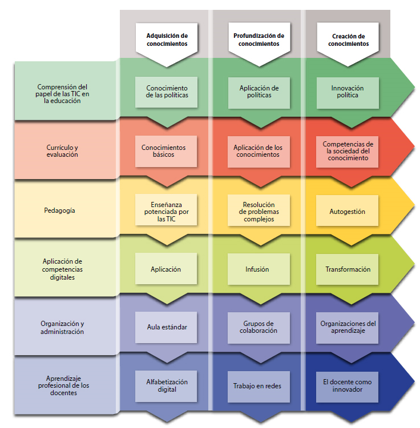
Fig. 1- Standard is for ICT teaching competencies
Source: UNESCO, 2019
Consequently, studies like the Horizon Report, trends in university education ( Horizon 2019) recognizes the formation of digital skills in teaching as a difficult challenge to address and on which we must continue to make efforts from all involved in the process.
This is how the concept of digital competence is classified as multidimensional, in which a set of skills and attitudes interrelated covering technical aspects includes informational, creation of content, media, communication, solution of problems and taking of strategic and ethical decisions. This results become in more than technological skills, and in acquiring and developing a critical position regarding the use of ICT (Cabero-Almenara & Palacios-Rodríguez, 2020; Sánchez- Caballé et al., 2020).
In this regard, García Aretio (2009) tells us:
... In the most innovative virtual environments, it is not for students and teachers to do more or less the same as it was being done in face teaching scenarios. Apart from the structural change of a temporal period nature, in the new educational environments the responsibilities and tasks of both groups also change substantially. The commitments to the ways of teaching and learning are different.
In this article, we will not be looking to define which model of digital skills to follow to evaluate the performance of teachers, although the author assumes the support provided by UNESCO in 2019, the necessity for these skills are formed therein are recognized.
In the case of Peru, before the declaration of a pandemic, the strategy I learn at home was presented, by the Ministry of Education of Peru, which represent a change for parents, students and teachers, the latter with the requirement not only to teach, but also a quality teaching. In this sense, after more than a year of the experience , and taking into account the words of the representative of UNESCO IESALC when he said: "From the perspective of UNESCO, it is not about promoting the use of technology itself, but rather of asking ourselves the question of whether using technology intensively we can improve pedagogical quality" (Pedró, 2021). The objective of this work lies in exposing the fact that training distance in times of COVID-19 has had on the digital skills of teachers of Educational Institution CECAT "Marcial A. Charan" and which challenges remain for the future.
MATERIALS AND METHODS
Taking into consideration the objective stated in the introduction, a non-experimental study of a descriptive, transactional and quantitative field was developed, which included 36 teachers from the CECAT Educational Institution "Marcial A charán", district and province of Trujillo, La Libertad region in Peru, who in the period March 2020 - March 2021 taught at a distance as a result of the COVID-19 pandemic.
To obtain the results, a virtual survey was applied, taking into account the standardization of competencies given by UNESCO, through the google forms tool, which was applied after socialization through zoom with the teachers. Likewise, the monitoring of the teaching activity of the teachers in the analyzed period was taken into consideration.
RESULTS
Relating the use of ICT with the policies prioritized by the Ministry of Education in Peru in 2021 demands to promote scientific education and the use of new educational technologies in the national educational system, promote initial training and teacher professional development, reassessing its role within the framework of the public teaching career, promoting an efficient and decentralized educational management, highly professional and developed with criteria of public ethics, intersectoral coordination and broad participation.
However, before March 2020 teachers did not make systematic use of ICT and platforms available for knowledge manage, collaborate and exchange experiences, which meant that starting to use the Platform I learn at home in 2020, as a result of the health emergency caused by COVID-19, 58.3 % of the teachers surveyed classified their digital skills in the initiation category, as can be seen in figure 2.
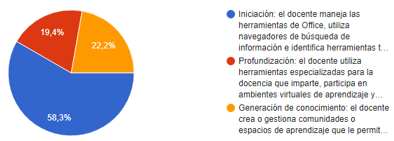
Fig. 2 - Percentages of categorization of digital competences of teachers of the Educational Institution CECAT "Marcial A. Charán" of the district and province of Trujillo, La Libertad region in Peru, according to UNESCO standardization.
The transition from classroom teaching to distance learning was cataloged difficult, with limitations, overwhelming; it is also conceived as a professional development challenge, as a new experience.
In all cases, teachers recognize the abrupt change and the differences that this change may entail, but with the certainty, in 77.8 %, of the need to possess advanced digital skills for the development of distance learning.
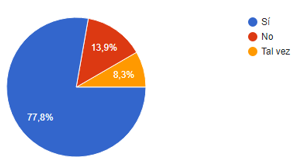
Fig. 3- Percentage of recognition of the need to possess advanced digital skills for distance learning.
This high recognition of a need that did not allow waiting times, endured to seek ways to prepare and develop digital skills. Although the higher per cent were based on the self preparation and help finding other partners, other routes are also recognized as the oversight and search for experiences in the scientific literature (figure 4).
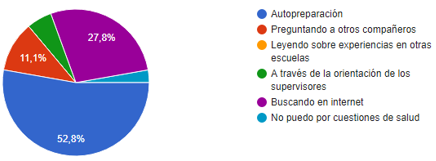
Fig. 4 - Main pathways used by teachers to develop digital competencies.
While it is true that the priority of governmental and institutional responses has focused on covering the health front, adjusting calendars, contributing from research and development to mitigate the pandemic, guaranteeing the continuity of training activities through distance education They have also developed alternatives that make it easier for teachers to develop digital skills and recognize the need for preparation in this regard.
This has caused that, in the course of a year, the teachers of the Educational Institution CECAT "Marcial A. Charán" of the district and province of Trujillo, La Libertad region in Peru, regardless of the routes used, feel safer when using technologies for the development of distance education.
However, although the improvement in terms of digital skills has been significant and it is expressed in the continuity of the education process and the use of a variety of technological tools (Figure 5), the main concern of teachers and management is given by the preparation (figure 6) that needs the teacher to develop the educational dimension of these digital skills.
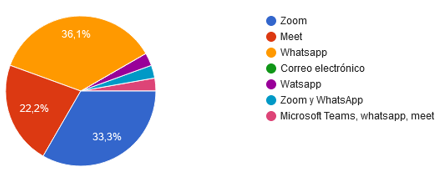
Fig. 5- Different technological tools used by teachers for the continuity of the teaching process in the face of the COVID-19 emergency
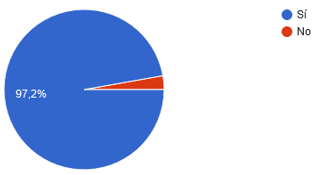
Fig. 6 - Recognition by teachers of the need for greater preparation for the development of distance teaching
Of those that were surveyed, 78 % express that, although they use technological tools or digital platforms to teach their classes, they still do not know how to adequately integrate ICT in a distance process that goes beyond the change of physical space and the reduction of content loading. In this sense, and considering the reality imposed by the COVID-19, the digital skills of teachers go far beyond and interact with technology and it is necessary that they can integrate them in the planning, development and the evaluation of teaching practice in the teaching-learning process.
DISCUSSION
The determination, evaluation and training of digital skills of teachers has been a recurring theme during 2020 and so far in 2021, due to the declaration of a COVID-19 pandemic and the need to give continuity to the teaching process in the different educational levels.
Although the main focus is placed on the impacts on students, the most evident impact on teachers is the expectation, if not a requirement, of the continuity of the teaching activity under the virtual modality. On the use that, in practice, each teacher made of the virtual classroom, their ability to give continuity to their teaching depends to a large extent (UNESCO-IESALC, 2020).
A study conducted in September 2020 by the Development Bank of Latin America in four countries in the region (Chile, Ecuador, Mexico and Peru) and as a result of an analysis of the databases of PIAAC, an International survey of the Organization for Economic Cooperation and Development, which digital measures skills among others, reflects the results of teachers in the region, where 7 % did not have the necessary skills to complete the evaluation on a computer, 39 % were located at level low to 1, 40 % at level 1 and 13 % at levels 2 and 3. This shows that the vast majority of teachers in the region may not have the necessary digital skills to have an active role in ICT-based teaching-learning processes, because they could not carry out online activities that are not basic or with which they are not familiar (Estrada, 2020), results that correspond to those emanating from the study in the "Marcial Acharán" Educative Institution CECAT.
Similar results are presented by Britez (2020) in a study carried out in Paraguay, Brazil and Argentina, and which exposes the positive reality of the attitude of teachers towards the use of ICT as one of the digital competences that teachers must possess in times of pandemic, which is in contrast to the low levels of preparedness to carry it out. This element, being found in an analogous way in our study, reinforces the need to delve into the subject and prepare teachers from educational institutions in digital skills to teach quality distance classes.
On the other hand, ECLAC-UNESCO Morata (2020) states that the use of these new formats requires trained and empowered teachers so that they can make pedagogical decisions based on the curricular guidelines defined in each country and the conditions and circumstances of their students. While during the pandemic many actors have been driven to put materials and available resources on different platforms, the body teacher needs time and guidance to explore them, know them and have criteria for decision making on its use.
The foregoing reinforces the thought that, the greater the virtuality, a greater pedagogical foundation is needed in the teaching-learning process and, therefore, reinforcing the pedagogical dimension of the development of digital competences. In this regard, more and more authors in just one year warn of the need to emphasize the methodology for the application of distance education in pandemic conditions, taking into account that it has marked a gap between new virtual teachers greater than that given by access technologies (Abella Garcia, Grande de Prado, Garcia-Peñalvo & Corell, 2020; Garcia Peñalvo, 2020b).
The results obtained in the study carried out and those that have been consulted by other authors, although insipient due to the time that we have been in an emergency, reveal a reality that requires urgent intervention and a response from the agencies and institutions in order to develop teacher skills, which allow them not only to interact with technology, but also teachers who can make pedagogical decisions based on the curricular guidelines defined in each country and the real conditions of their students , who are capable of implementing virtual teaching - learning strategies. This marks the main challenge that teachers face in times of COVID-19.
BIBLIOGRAPHIC REFERENCES
Abella García, V.; grande de Prado, M.; García-Peñalvo, f. J.; Corell, A. (2020). Guía de recomendaciones para la evaluación online en las Universidades Públicas de Castilla y León. Versión 1.1. Castilla y León, España: Universidad de burgos, Universidad de León, Universidad de Salamanca y Universidad de Valladolid.
Britez, M. (2020). La educación ante el avance del COVID-19 en Paraguay. Comparativo con países de la Triple Frontera. SciELO-Scientific Electronic Library Online. https://doi.org/10.1590/SciELOPreprints.22
Cabero-Almenara, J., & Palacios-Rodríguez, A. (2020). Marco Europeo de Competencia Digital Docente «DigCompEdu». Traducción y adaptación del cuestionario «DigCompEduCheck-In». Revista de Educación Mediática y TIC, 9(1), 213-234. https://doi.org/10.21071/edmetic.v9i1.12462
CEPAL-UNESCO (2020). La educación en tiempos de la pandemia de COVID-19. Informe COVID-19, CEPAL-UNESCO.
García-Peñalvo, f. J. (2020b). La metodología antes que la tecnología para afrontar la nueva normalidad docente en la universidad. Ciclo de Webminars "La nueva realidad docente de la Universidad de Salamanca: Lecciones aprendidas y reflexiones". Salamanca, España. https://doi:10.5281/zenodo.3900279.
MINEDU. (2016). Estrategia nacional de las tecnologías digitales en la educación 2016-2021: De las TIC a la inteligencia digital (p. 25). MINEDU. http://repositorio.minedu.gob.pe/bitstream/handle/MINEDU/5937
Morata Sanz, J. I. (2020). Uso de TIC en orientación educativa en tiempos de COVID-19. AOSMA, (No Extra 28), 88-91. https://dialnet.unirioja.es/descarga/articulo/7381638.pdf
Pedró, F. (2020). COVID-19 y educación superior en América Latina y el Caribe: efectos, impactos y recomendaciones políticas. Análisis Carolina, 36(1), 1-15. https://dialnet.unirioja.es/servlet/articulo?codigo=7642921
Sánchez-Caballé, A., Gisbert-Cervera, M., & Esteve-Mon, F. (2020). The digital competence of university students: a systematic literature review. Aloma: Revista de Psicologia, Ciències de l'Educació i de l'Esport, 38(1), 63-74. http://revistaaloma.net/index.php/aloma/article/view/388
UNESCO-IESALC (2020). COVID-19 y Educación Superior: De los efectos inmediatos al día después. UNESCO-IESALC. Disponible en: http://www.iesalc.unesco.org/wp-content/uploads/2020/05/COVID -19-ES-130520.pdf
Conflict of interest:
Author declares not to have any conflicts of interest.
Author´s Contribution:
The author prepared 100% of the article individually, complying with the different actions corresponding to this purpose. .
![]()
This work is under a licencia de Creative Commons Reconocimiento-NoComercial 4.0 Internacional
Copyright (c) Sheila Sierralta Pinedo